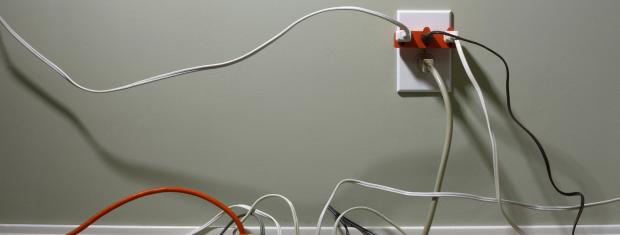
Reaching for Safety: 10 Do's and Don'ts of Using Extension Cords
Extension cords cause over 3,000 home fires each year, resulting in an average of 50 fatalities and nearly 300 injuries. Oftentimes, extension cords are used improperly and can overheat or short out. Did you know that extension cords are in fact a temporary solution? Many people are unaware that they should never be used as a long-term solution.
Using electrical cords properly is crucial to keeping your home and your family safe:
DO:
- Check cords for damage before use. Look for exposed/fraying insulation or wires and damaged prongs.
- Use polarized and/or three-prong plug extension cords.
- Do your best to keep extension cords in an open area free of obstructions so it can release heat properly.
- Make certain your cord has the mark of an independent testing laboratory ensuring it meets governmental safety regulations, such as Underwriters Laboratories (UL), Intertek (ETL) or Canadian Standards Association (CSA).
- Keep cords away from water.
- Install additional outlets where you use extension cords frequently as a more permanent and safe solution.
- Use indoor extension cords indoors only and outdoor extension cords outdoors only.
- Fully insert the plug of an extension cord into an outlet, securing the connection.
- Store extension cords indoors.
- Unplug extension cords when not in use.
DON’T:
- Do not allow extension cords to run through water or snow on the ground.
- Do not attempt to plug extension cords into one another.
- Never use an extension cord that has a lower wattage rating than the tool being used with it.
- Do not place furniture on top of extension cords. This can short out the cord and cause a shock fire at the outlet.
- Never place cords under rugs, carpets or any busy areas of your home. If your cord is covered, heat cannot escape, which may result in a fire hazard.
- Don’t drive over extension cords.
- Never force an extension cord into an outlet.
- Never alter the extension cord, such as cutting the third prong to fit into a two-prong outlet.
- Never substitute extension cords for permanent wiring.
- Don’t use extension cords or power strips with heaters or fans, they can cause cords to overheat and catch fire.
Remember to be mindful any time your dealing with electricity. So many of the losses we see from home fires could have easily been prevented by using electrical cords properly.
For more tips at home or on the road, follow us on Facebook!


